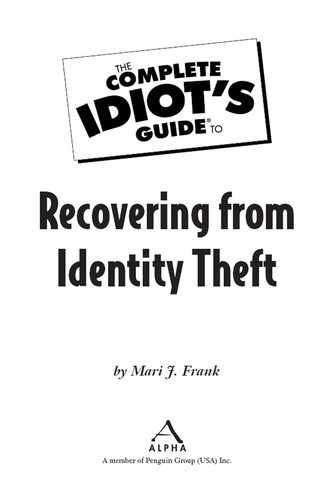Credit Card Account-Takeover Fraud
If you only have to deal with credit account-takeover fraud, which could happen if your credit-card information or the physical card itself was stolen—relax. It is the easiest situation to face because the FCBA gives you some powerful tools to correct the problem. (Note that this only covers credit card account-takeover, not debit card account-takeover, which I discuss in Chapter 7.)
Take the following steps:
1. Immediately review your credit-card bills as soon as they arrive by mail or online, but, at the very latest, within 30 days of receiving your credit-card bill. When you first see a fraudulent charge, contact the credit-card company by phone to alert them to any questionable charges on your bill. At that point, ask them for the address for any correspondence about fraud.
2. If there is only one charge you don’t recognize, first call the vendor about the fraudulent purchase. Its phone number should be on the credit-card statement. You may not recognize the merchant account name, but the charge might still be legitimate. Ask the vendor about the charges; you’ll know if its fraud or really your own purchase. If there is only one fraudulent charge, tell the credit card company, but you need not close the account.
3. If you see several charges that are clearly fraudulent, immediately call the credit-card company to ask for a new card with a new number in its place, even if you don’t have all the information yet. Always replace a credit card immediately, since you may have trouble getting credit when you are a fraud victim until all is resolved. It is far easier for the issuer to send you a new card with a different number than for you to deal with the potential of continuing fraudulent charges.
4. Put a new password on the account to keep unauthorized people from gaining access.
5. The credit-card company should report to the CRAs that the account is closed due to fraud.

Identity Crisis
Remember that you’re dealing with an identity thief who may have access to your personal information. Make sure you safeguard your sensitive data offline and online. Never use a password such as your mother’s maiden name, child’s name, and so on. Make up a nonsense word that uses at least 12 characters, including numbers, symbols, and upper- and lowercase letters.
Disputing Fraudulent Charges
Once you cancel your credit card due to fraud, the credit-card company will send you an affidavit to sign regarding the fraudulent purchases. You will need to send back the completed affidavit. Identify each fraudulent charge. The company will investigate the charges. Unless there are suspicious circumstances (such as a family member’s receipt of your card at your address), you will not be held responsible for the unauthorized charges, and will not need to send any further letters. Of course, you will need to pay all the authorized charges on the billing statement.
If the company does not believe you and tries to hold you accountable for the fraudulent charges, then you will need to write a follow-up letter with the following information:
♦ A statement that you are a victim of credit-card fraud listing the identifiable fraudulent charges.
♦ A statement that you are making your request under the Fair Credit Billing Act.
♦ A demand that the charge(s) be immediately removed.
♦ A request for a copy of the company’s fraud-dispute form(s), policy, and the contact information for the person who receives appeals.
♦ A request for the name and contact information of the fraud investigator who is handling your account.
♦ A request that the fraud investigator contact you.
♦ A request that copies of the purchases, including signatures and other documentation of the disputed charges, be sent to you, as well as the results of any investigation.
♦ A demand that the account be closed due to fraud and be reported as such to the CRAs.

Identity Crisis
Send all correspondence return-receipt requested to the address for fraud correspondence that you requested when you initially called. Don’t send fraud correspondence to the billing address because your requests could be easily lost in the shuffle of the wrong department.
As I mentioned earlier in this chapter, the credit-card company has 30 days to respond to your letter and no more than 90 days to investigate and resolve the issue. That’s why it’s so important to keep copies of your return receipt. If you don’t receive either the initial response or the results of the investigation within the specified time frames, then write the fraud investigator, return-receipt requested, and demand per the Fair Credit Billing Act that the charges be immediately removed from the account due to delay in the investigation.
..................Content has been hidden....................
You can't read the all page of ebook, please click here login for view all page.
